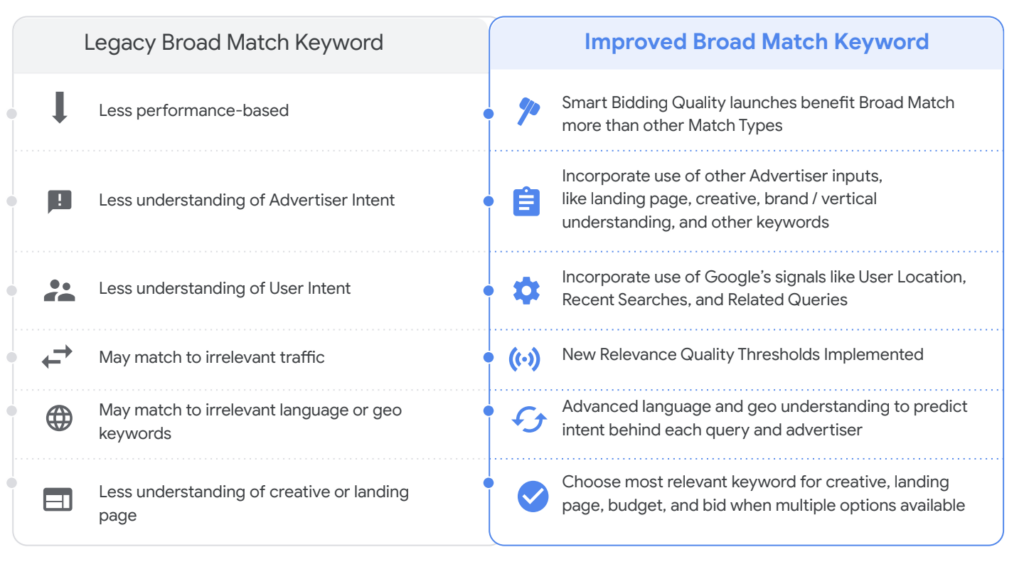Google’s Broad Match Upgrade: A Game Changer for Lead Generation
October 16, 2024

In the fast-paced world of digital advertising, understanding how Google Advertising operates is critical to maximizing your campaign dollars and generating bottom-line results. Because Google changes its algorithms frequently, and is constantly adding new tools, it’s important to stay current AND experiment to optimize your own results. Tactics that didn’t work before, might work now, such as Google’s enhanced broad match keyword functionality.
By continuing to experiment with the technology, we’ve generated a remarkable 10% increase in our partner conversion rates recently. Here’s what you need to know.
Understanding Match Types
Before we go any further, let’s understand some of the base information. Google classifies keyword campaigns into three match types, each with its own level of specificity:
1. Broad Match: Keywords may generate ads that don’t match exactly. For example, a Google broad match search for “senior living” could include variations like:
- “assisted living facilities”
- “senior housing options”
- “retirement communities”
- “elderly care homes”
- “senior apartments”
If someone types a broad match keyword like “senior living,” their search results might show ads or listings related to any of these variations or even related topics, helping capture a wider audience. This broad match type attracts more visitors, reduces the need for extensive keyword lists, and allows you to focus on effective spending. In this case, effective equates to more leads and the identification of new keyword phrases you might not have considered previously.
Broad match is the default setting for all your keywords, so you don’t need to specify another match type.
2. Phrase Match: Keywords may generate ads that relate to the meaning of your keyword, including implied meanings. For example, a Google phrase match search using “senior living,” the search would specifically look for that exact phrase and variations that include it. Examples might include:
- “affordable senior living”
- “best senior living options”
- “senior living near me”
- “independent senior living communities”
In this case, results will focus on pages that contain the exact phrase “senior living,” expanding to include additional words before or after it. Phrase match allows you to reach more searches than exact match but fewer than broad match, which helps show ads that include your product or service.
3. Exact Match: Keywords may generate ads that have the same meaning or intent as your keyword. For example, a Google exact match search using “senior living,” would only return results that contain that specific phrase without any additional words. For example, a search for “senior living” would yield results that include exactly “senior living” and nothing else. This means no variations or additional terms—only content that matches that exact phrase. Among the three matching options, exact match offers the most control over the viewers who see your ad but reaches fewer searches than phrase and broad match.
By strategically using these match types, you can better connect with your target audience.
The Shift to New Broad Match in Senior Living Advertising
Historically, digital ad strategists avoided broad match keywords because of poor performance. However, Google has recently introduced transformative enhancements that leverage smart bidding and target users most likely to generate leads—not just clicks. This shift allows ads to be served based on buying signals, significantly improving conversion potential.
Leveraging these changes, we increased our use of broad match keywords from 3% to 24% of our total Google Ads spending, leading to a remarkable 10% increase in overall conversion rates.
Here’s what you need to know to achieve similar results in your own senior living advertising program:
1. Smart Bidding Quality Launches: Smart Bidding has revolutionized its approach to broad match keywords by employing real-time optimizations to target users most likely to convert. This machine learning-driven strategy maximizes return on investment through performance-based bid adjustments.
2. Leveraging Google’s Signals: Google now utilizes valuable user signals such as location, recent searches, and related queries. This means that users searching for terms like “assisted living” in specific areas, such as Spokane, are more likely to see relevant ads, enhancing audience targeting.

These enhancements empower advertisers to refine their strategies and achieve better results, making broad match a cornerstone of any digital marketing program.
The Time is Now!
As the landscape of Google Ads continues to evolve, it’s important to adopt change. Using improved broad match keywords and smart bidding, we have achieved greater success and higher conversion rates for our client partners. For senior living marketers eager to boost your own performance, it’s time to embrace these innovations. By continuously refining your strategies, you can effectively reach your audience and drive measurable ROI that contributes to business growth.